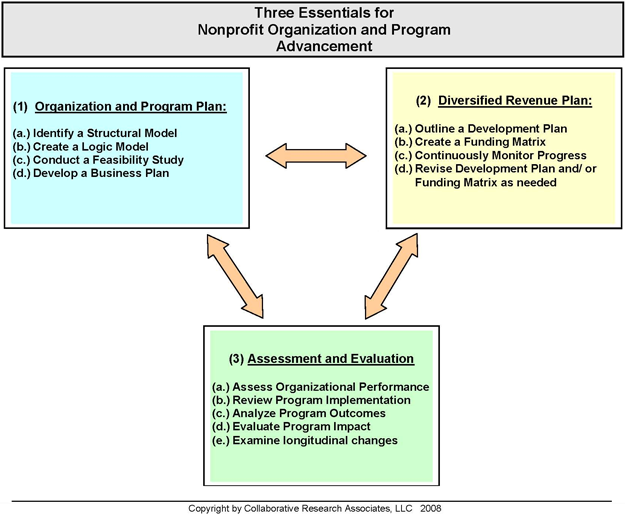CRA Services CRA provides comprehensive, customizable services for educational and community-serving programs. Founder and Managing Director, Dr. Anne Clark, has drawn on more than two decades of professional experience to design the Three Essential Proccesses Modelwhich guides CRA’s work in three areas essential to program advancement:
Organizational and program planning Organizational and Program planning are a component of CRA’s Three Essentials Model for effective programs. Dr. Anne Clark has extensive experience with organizational needs assessments and program theory (logic model) development. When CRA clients need assistance with business planning and feasibility studies, the CRA project team will include highly qualified business consultants to ensure that the CRA project team meets the client’s specific planning needs. An appropriate revenue plan is a component of CRA’s Three Essentials Model for effective programs. CRA provides program resource development services to help clients develop and implement a highly targeted revenue plan. Dr. Anne Clark has substantial experience with federal grant application and administration processes and has collaborated in obtaining large, multi-year corporate and foundation funding for nonprofit organizations. Other CRA project team members work with clients to create, update, and implement an effective Resource Development Plan and Funding Matrix to guide organization and program resource development efforts. Program assessment and evaluation Assessment and Evaluation are a component of CRA’s Three Essentials Model for effective programs. A well designed and implemented evaluation supports program advancement by assessing the program’s work and results. CRA works with programs to identify evaluation questions about how the program is being implemented, the effects the program has for participants, and how the program is using its resources. Then CRA systematically collects evidence from program documents and from those involved in the program, using various methods such as surveys and interviews. CRA analyses and interprets this evidence in order to answer the evaluation questions and make recommendations for organizational and program adjustments based on the evaluation findings. CRA is an active member of the American Evaluation Association and ensures sound, ethical evaluation practices by conforming to AEA’s Guiding Principles for Evaluators. |


